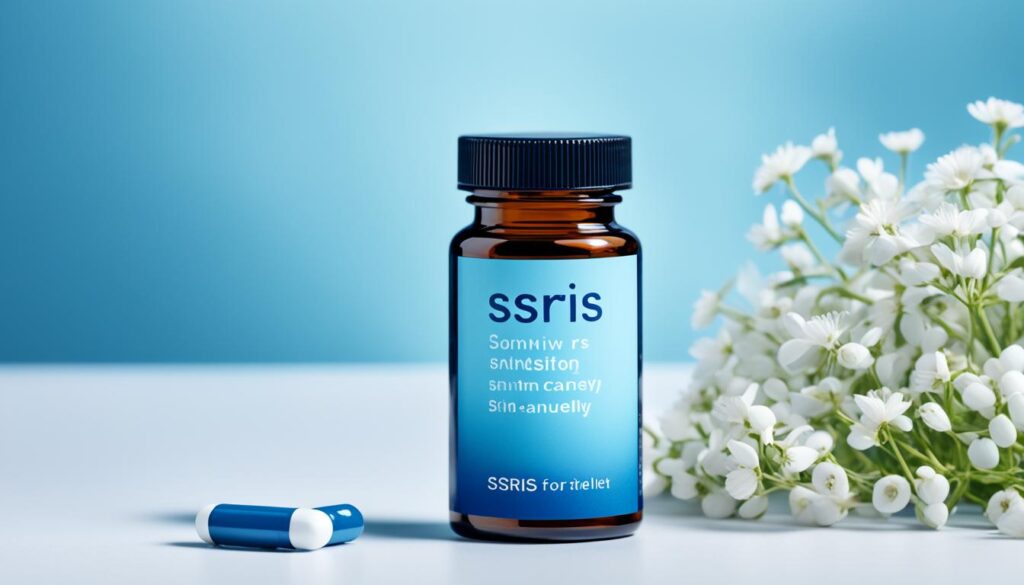Understanding Anxiety Medication Options

If you’re struggling with anxiety, you’re not alone. In the US, 40 million adults face this issue. It’s the most common mental illness here. Good news – there are treatments that work, including medication. Learning about these options and their side effects is key to handling your mental health well.
We’ll take a closer look at anxiety medications in this article. We will cover different types, their benefits, and things to consider. It’s also crucial to get a medical check before starting any medication. We’ll talk about SSRIs, SNRIs, TCAs, benzodiazepines, and natural options. Plus, we’ll see how combining medication with therapy and lifestyle changes can help.
Knowing about anxiety medication options is vital. It helps you make informed choices with your doctor. This can lead to finding the best treatment plan for you. So, let’s dive in and explore the choices available. Moving forward, we aim to find a brighter and calmer future together.
Medical Evaluation for Anxiety Symptoms
Getting checked by a doctor is key before thinking about anxiety medicine. This is to make sure there aren’t any health issues causing anxiety-like symptoms. Conditions like hyperthyroidism, abnormal blood sugar, or heart issues can look a lot like anxiety.
A doctor will look at your symptoms and past health deeply. They may suggest tests like blood work or an ECG. These help figure out if there’s a health reason for how you’re feeling.
If they find a health issue, they’ll tell you how to treat it. But, if your symptoms don’t link to any specific health problem, an anxiety disorder might be the reason. In this case, you’ll need more tests and treatments for anxiety.
Anxiety disorders deeply affect daily life with a lot of worry, fear, or nervousness. Symptoms often include feeling a fast heartbeat, sweating, shaking, or having trouble focusing.
An accurate diagnosis is very important to treat it right. It makes sure your anxiety isn’t wrongly blamed on other health issues. This helps in managing anxiety well, including deciding if medicine is needed.
During your check-up, talk openly about what you’re feeling and your health history. This helps your doctor make the right diagnosis and plan the best treatment for you.
Anxiety Symptoms
People feel anxiety in different ways. Some common signs are:
- Excessive worrying
- Feeling restless or on edge
- Irritability
- Trouble concentrating
- Sleep disturbances
- Panic attacks
- Physical symptoms such as increased heart rate, shortness of breath, or dizziness
If you notice these signs, getting checked by a doctor is important. It helps find out why you feel this way and how to treat it.
Types of Anxiety Medications
Many medications are available to ease anxiety symptoms. They fall into various classes based on how they work and their effects.
Antidepressants: SSRIs
Selective serotonin reuptake inhibitors (SSRIs) are often used for anxiety. They boost serotonin, a brain chemical that affects mood. Drugs like citalopram, escitalopram, fluoxetine, paroxetine, and sertraline are common for treating anxiety.
Other Medication Classes
Besides SSRIs, other types of medication can help with anxiety. These include:
- Antihistamines: Some, like hydroxyzine, can calm anxiety due to their sedating effect.
- Beta-blockers: Drugs like propranolol can lessen anxiety’s physical signs, such as shaking and a fast heartbeat.
- Anticonvulsants: Medications like pregabalin and gabapentin can help, especially if the person also has epilepsy.
Benzodiazepines and Buspirone
Benzodiazepines and buspirone are for sudden anxiety or panic. Benzodiazepines like alprazolam and diazepam work fast to reduce anxiety symptoms. Buspirone helps with ongoing anxiety and short-term symptoms without being a benzodiazepine.
The choice of medication depends on the anxiety type and the person’s reaction to the treatment. It’s crucial to work with a doctor to find the best medication and dose.
The image shows various anxiety medications. It’s for showing purposes only and might not show actual medication brands or doses.
| Medication Class | Examples |
|---|---|
| Antidepressants: SSRIs | Citalopram, Escitalopram, Fluoxetine, Paroxetine, Sertraline |
| Antihistamines | Hydroxyzine |
| Beta-blockers | Propranolol |
| Anticonvulsants | Pregabalin, Gabapentin |
| Benzodiazepines | Alprazolam, Clonazepam, Diazepam, Chlordiazepoxide, Lorazepam |
| Buspirone | Buspirone |
SSRIs for Anxiety
Selective Serotonin Reuptake Inhibitors (SSRIs) are the top choice for treating generalized anxiety disorder. These drugs work by blocking serotonin from being reabsorbed. Serotonin is linked with how we feel emotionally. More serotonin in the brain can lead to a better mood and less anxiety.
Here are some SSRIs often given for anxiety:
- Citalopram
- Escitalopram
- Fluoxetine
- Paroxetine
- Sertraline
Remember, SSRIs don’t work right away. It may take weeks to feel their full effect. Doctors usually have people take them daily for a certain period. Compared to other anxiety medicines, SSRIs are easier to handle because they have fewer side effects.
Efficacy and Side Effects
SSRIs are proven to help with anxiety. Many studies back up their ability to lessen anxiety symptoms. People using them tend to see a big improvement in their lives.
While mostly safe, SSRIs can cause side effects for some. These can differ from one person to another.
- Nausea or stomach issues
- Headaches
- Problems sleeping
- Sexual problems
Talking with a doctor is key to figure out if SSRIs are right for you. They’ll help balance the pros and cons.
“SSRIs are a common and effective treatment option for individuals with generalized anxiety disorder.”
| Medication | Indication | Dosage | Common Side Effects |
|---|---|---|---|
| Citalopram (Celexa) | Anxiety disorders | 10-40 mg/day | Nausea, dry mouth, fatigue |
| Escitalopram (Lexapro) | Anxiety disorders | 5-20 mg/day | Nausea, dizziness, insomnia |
| Fluoxetine (Prozac) | Anxiety disorders | 20-80 mg/day | Insomnia, headache, nausea |
| Paroxetine (Paxil) | Anxiety disorders | 10-60 mg/day | Drowsiness, sexual dysfunction, dry mouth |
| Sertraline (Zoloft) | Anxiety disorders | 25-200 mg/day | Nausea, diarrhea, sexual dysfunction |
Keep in mind, this info is just a starting point. Your treatment should fit your personal health needs. Always work with a medical professional for advice.

SNRIs and TCAs for Anxiety
Serotonin-norepinephrine reuptake inhibitors (SNRIs) and tricyclic antidepressants (TCAs) are medications used to treat anxiety. SNRIs, like venlafaxine and duloxetine, increase serotonin and norepinephrine levels in the brain, reducing anxiety symptoms. TCAs, such as amitriptyline and imipramine, block these neurotransmitters’ reabsorption. However, TCAs are less common due to potential side effects.
Both SNRIs and TCAs can help manage anxiety. They may take weeks to take full effect. A healthcare professional should closely monitor these medications for any side effects.
SNRIs and TCAs are effective in reducing anxiety symptoms by targeting the brain’s neurotransmitters serotonin and norepinephrine.”
Side Effects of SNRIs and TCAs
SNRIs and TCAs can have side effects. SNRIs may cause nausea, dizziness, insomnia, and sexual dysfunction. TCAs might lead to dry mouth, constipation, and blurred vision. Talk to a healthcare provider about any side effect concerns.
Comparison of SNRIs, TCAs, and SSRIs
Let’s compare SNRIs, TCAs, and SSRIs. We’ll look at their effectiveness, side effects, and potential interactions:
| Medication | Effectiveness | Side Effects | Interactions |
|---|---|---|---|
| SNRIs | Effective in reducing anxiety symptoms | Nausea, dizziness, insomnia, sexual dysfunction | Potential interactions with other medications, including MAOIs |
| TCAs | Effective, but not commonly prescribed due to side effects | Drowsiness, dry mouth, constipation, blurred vision | Potential interactions with other medications, including MAOIs |
| SSRIs | Often the first-line treatment for anxiety | Mild side effects compared to SNRIs and TCAs | Some interactions with other medications, including MAOIs |
Choosing the right medication for anxiety treatment should be done with a healthcare professional. Everyone reacts differently to medications. The healthcare provider will consider many factors, like medical history and current medications, to find the best anxiety medication.
Benzodiazepines for Acute Anxiety
Benzodiazepines are often used to treat sudden anxiety and panic attacks. These drugs offer fast relief, making people feel better quickly when they’re really stressed or scared.
Doctors might prescribe medicines like alprazolam, clonazepam, diazepam, chlordiazepoxide, and lorazepam for sudden anxiety. They help calm the brain by boosting the action of a neurotransmitter called GABA. This brings a sense of peace and relaxation.
But, it’s important to remember that benzodiazepines are meant for short-term use. Using them for too long can lead to addiction and other problems. Stopping them suddenly can also cause withdrawal symptoms.
Common side effects include feeling tired, dizzy, irritable, and having trouble thinking clearly. Mixing these meds with alcohol, opioids, and other sedatives can be dangerous. It can make you way too sleepy and slow down your breathing.
“Benzodiazepines are highly effective in providing immediate relief for individuals experiencing acute anxiety or panic attacks. However, due to their potential for addiction and abuse, they should be used cautiously and for the shortest duration possible.”
Working with a healthcare professional is key when taking benzodiazepines for anxiety. They will make a treatment plan that’s right for you. They’ll also watch out for any negative effects or signs of becoming dependent on the medication.
While benzodiazepines are good at managing anxiety quickly, they should be part of a larger treatment plan. This could include therapy or other approaches to deal with the root causes of anxiety. Combining medication with therapy and changes in your lifestyle can lead to better coping skills and less dependence on drugs.

| Benzodiazepine | Brand Name | Usage | Short-Term Use | Common Side Effects |
|---|---|---|---|---|
| Alprazolam | Xanax | Acute Anxiety, Panic Attacks | Yes | Drowsiness, Dizziness, Irritability |
| Clonazepam | Klonopin | Acute Anxiety, Panic Attacks | Yes | Drowsiness, Dizziness, Cognitive Impairment |
| Diazepam | Valium | Acute Anxiety, Panic Attacks | Yes | Drowsiness, Dizziness, Irritability |
| Chlordiazepoxide | Librium | Acute Anxiety, Panic Attacks | Yes | Drowsiness, Dizziness, Cognitive Impairment |
| Lorazepam | Ativan | Acute Anxiety, Panic Attacks | Yes | Drowsiness, Dizziness, Irritability |
Natural Remedies for Anxiety
Many people look for natural ways to ease anxiety. They often try natural anxiety meds like lavender, chamomile, and valerian root. These herbs are popular for reducing anxiety symptoms in a natural way.
Keep in mind, what works can vary from person to person. Some may find natural treatments helpful, but they’re not for everyone. Always talk with a doctor before trying out natural remedies.
Over the counter anxiety medication is also an option. You can get these without a doctor’s prescription. But, be careful with over-the-counter meds. Make sure to consult a healthcare professional. They can help you find the right dose and check if it’s safe with other meds you’re taking.
Natural Remedies Comparison
| Natural Remedy | Benefits | Potential Side Effects |
|---|---|---|
| Lavender | May promote relaxation and reduce anxiety | May cause skin irritation or allergic reactions in rare cases |
| Chamomile | May help with sleep and calming the nervous system | May cause allergic reactions in individuals with ragweed allergies |
| Valerian Root | May aid in sleep and relaxation | May cause headaches, dizziness, or stomach upset in some individuals |
“Natural remedies can provide individuals with alternative options for managing anxiety. It’s important to explore different approaches and find what works best for you.”
Combining Medication with Therapy
Medication is often paired with therapy to treat anxiety disorders.
Types of psychotherapy like cognitive-behavioral therapy (CBT), psychodynamic psychotherapy, and supportive-expressive therapy help reduce anxiety symptoms (therapy for anxiety). Medication eases anxiety’s physical symptoms. Therapy works on the thoughts, behaviors, and feelings behind it.
The mix of medication and therapy gives deep and lasting relief from anxiety. It tackles both the body and mind parts of anxiety (anxiety medication comparison). This helps people control their symptoms better and learn ways to cope, improving their life quality.
“The blend of medication and therapy is a strong way to fight anxiety disorders. Medication quickly eases physical symptoms. Therapy tackles anxiety’s deeper reasons. Used together, they create a full and personalized treatment plan for people with anxiety.”
– Dr. Jane Johnson, Clinical Psychologist
It’s key to work with a healthcare provider or mental therapist when mixing medication and therapy. They help find the right mix of treatments for you.
Benefits of Combining Medication and Therapy for Anxiety
Medication and therapy together offer many advantages for those with anxiety:
| Benefits | Explanation |
|---|---|
| Comprehensive Treatment | Using medication and therapy covers all parts of anxiety. This full approach helps manage symptoms better. |
| Targeted Symptom Relief | Medication lessens anxiety’s physical signs, like fast heart rate or sweating. Therapy deals with anxiety’s root causes. |
| Improved Coping Strategies | Therapy teaches skills to handle anxiety better. This includes ways to reframe thinking or relax, helping manage stress. |
| Long-Term Maintenance | Together, medication and therapy support and keep up progress on anxiety symptoms. They help people maintain their improvement and avoid backsliding. |
Combining medication and therapy proves a multi-layered approach works well for anxiety. It lets people find much relief and take back control of their lives. Always talk to a healthcare expert to figure out the best medication and therapy mix for you.
Note: The image shows the value of mixing medication with therapy for anxiety issues.
Lifestyle Modifications for Anxiety
Making changes in your lifestyle can help with anxiety. Adding simple activities to your day can decrease anxiety symptoms. This can make you feel better overall.
Exercise for Anxiety
Exercise is great for your mental health. It lowers anxiety. When you exercise, your brain releases endorphins which make you feel happier.
Choose activities you enjoy like walking, yoga, or sports. Try to be active for 30 minutes on most days. Exercise improves your sleep and energy too.
Breathing Exercises for Anxiety
Deep breathing is a key method for lowering anxiety. When anxious, take slow, deep breaths to relax. Belly breathing is one good technique.
Sit and put one hand on your chest and the other on your belly. Breathe in deeply through your nose. Let your belly push your hand out. Breathe out slowly through your mouth. Do this several times and focus on your breath. You can do this exercise anywhere to ease anxiety.
“Deep breathing is simple but very effective. It lowers anxiety and makes you feel calm. Focusing on your breath helps you stay in the present and not worry.”
| Lifestyle Modifications | Benefits for Anxiety |
|---|---|
| Daily exercise | – Reduces anxiety levels – Releases endorphins for improved mood – Promotes better sleep |
| Breathing exercises | – Induces relaxation response – Reduces tension and stress – Shifts focus away from anxious thoughts |
Adding exercise and breathing exercises to your daily routine can really help with anxiety. Keep in mind, results can vary from person to person. It’s best to talk to a doctor or therapist to find out what will work best for you.
Conclusion
Anxiety medication can help manage anxiety disorders effectively. It’s a key part of the long-term approach. Yet, it’s not the only solution. Choosing the right medication depends on the anxiety type and personal factors. It’s vital to work closely with a healthcare provider. They will help find the right medication and dose, while watching for side effects.
Therapy is also crucial in treating anxiety. Techniques like cognitive-behavioral therapy target the thoughts and feelings behind anxiety. Adding habits like exercise and relaxation aids the treatment. They improve overall health and lessen anxiety symptoms.
Remember, always use medication under a healthcare professional’s watch. They oversee your progress and adjust treatment as needed. Always talk to a healthcare provider before starting or stopping any medication. This ensures safe and effective anxiety management.






